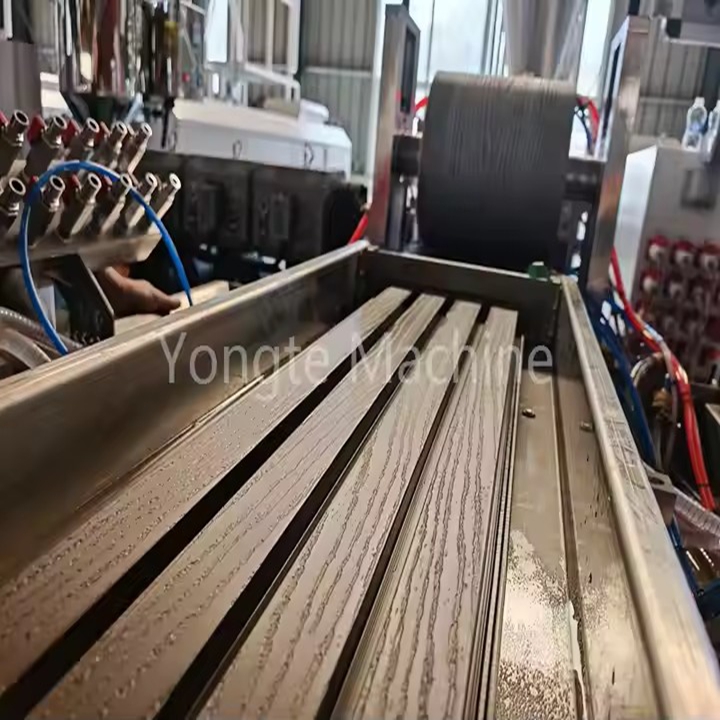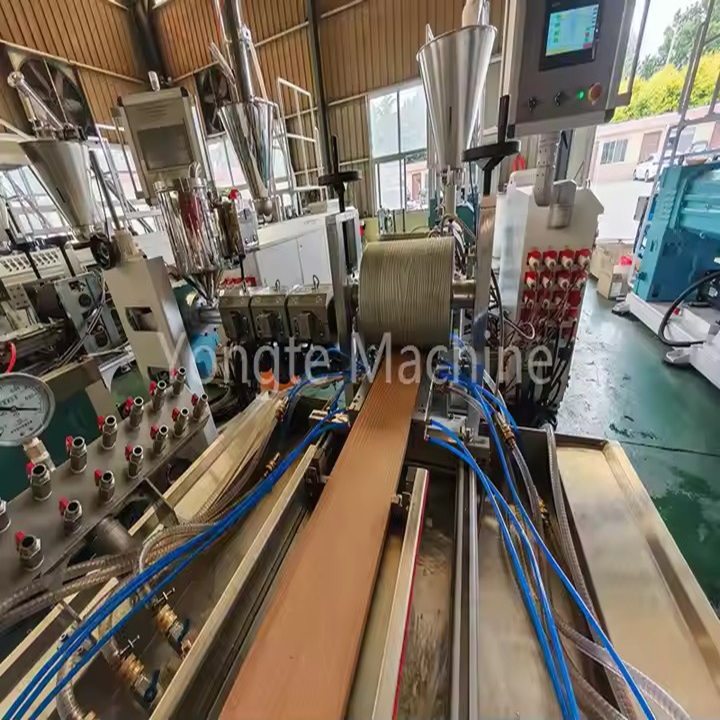Yongte Plastic Machinery has launched a comprehensive "formula + production line" solution to address the pain points of the PE wood-plastic foam industry.
PE wood-plastic foam, a rising star in the green building materials market, is highly sought after in applications such as outdoor flooring and home decor, thanks to its natural wood grain and durable plastic properties. However, behind this allure, the production process has long faced numerous challenges stemming from material incompatibility.
PE is a non-polar material, while wood powder is polar. The two are incompatible, much like oil and water. This leads to raw material agglomeration and surface cracking in finished products during production. The foaming process is a particularly challenging process: a mismatch between the foaming agent's decomposition rate and the material's melt strength results in uneven bubble size and a low closed-cell ratio. The conflict between lightweighting and mechanical properties is also a challenge: high expansion ratios can easily lead to brittle materials. Furthermore, wood powder's high hygroscopicity makes it susceptible to degradation in high-temperature processing environments, resulting in poor production stability and persistently low yield rates. Yongte Plastic Machinery's technical director admitted, "We've encountered many customers who repeatedly adjusted their formulas, only to have entire batches of products scrapped due to incompatible equipment and parameter mismatches. This single-point optimization approach doesn't solve systemic problems."

To address these pain points, Yongte Plastic Machinery has launched an integrated solution encompassing "formula optimization + customized production line" that covers the entire production process. On the formulation side, the R&D team precisely controls the moisture content of wood flour to 0.5%-1% through a pre-treatment process of "secondary drying + acetylation." The proprietary "MAH-g-PE + silane coupling agent" composite compatibility system improves interfacial bonding by 40%, effectively preventing gas escape during foaming. Based on different application scenarios, the team dynamically adjusts the wood flour to PE ratio and incorporates toughening materials such as EVA and POE to proactively mitigate mechanical property losses.
The equipment utilizes a core configuration of "vented twin-screws + variable-speed screws + precision die heads." The screw's three-stage temperature control design corresponds to the critical stages of raw material drying, plasticization, and foaming. The temperature increases in steps from 140°C to 185°C, preventing wood powder degradation while precisely matching the foaming agent's decomposition window. A built-in pressure stabilization system in the die head maintains outlet pressure at 8-12 MPa, preventing sudden pressure fluctuations that could lead to bubble bursting. An online closed-cell ratio detection device monitors the cell structure in real time, maintaining a stable closed-cell ratio above 85% and a cell diameter deviation within 0.2 mm.

For process control, a PLC intelligent system enables one-click setting and real-time monitoring of key parameters. The screw speed is strictly controlled within a safe range of 30-60 rpm, and the automatic feeding system minimizes ratio errors to within 0.1%. The team also offers customized process packages for different expansion ratio requirements, ensuring that even high-expansion foam products maintain a tensile strength exceeding 15 MPa and a flexural strength exceeding 25 MPa.
This solution has been successfully implemented at several companies in Shandong and Zhejiang provinces. The head of an outdoor flooring manufacturer stated that the yield rate has increased from 75% to 95%, production efficiency has increased by 20%, costs have decreased by 15%, and the product's water absorption expansion rate has dropped from 3% to 1.2%, significantly extending its outdoor service life. The general manager of Yongte Plastic Machinery stated that the company will continue to deepen collaborative innovation in materials and equipment, and provide full-cycle services from laboratory trials to industrial mass production to meet the production capacity needs of different customers, helping the industry achieve technological upgrades and capacity expansion.